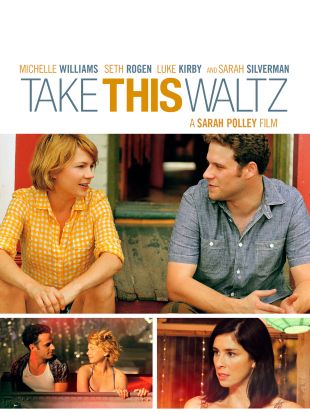
Let's talk about the idea of rapture, not in the Biblical sense, but in the secular world. The definitions of the word reveal that it can mean both a state of ecstasy and the concept of being swept away from your current surroundings. Much of the time, moviegoers are looking for exactly this feeling, although we usually just call it escapism. Writer/director Sarah Polley's second film, Take This Waltz, is a penetrating and engrossing character study about a woman looking to be enraptured that enraptures its audience at the same time.
Margot (Michelle Williams) is a 28-year-old freelance writer who has been married for a few years to Lou (Seth Rogen), a cookbook author specializing in chicken dishes. While on an assignment, Margot meets Daniel (Luke Kirby), strikes up a mildly flirtatious conversation with him during their flight home to Toronto, and discovers that the handsome young man recently moved in across the street from her and Lou. Over the course of a few weeks, she finds herself spending more and more time with this intriguing new acquaintance -- filled with a desire that she both wants to give in to and run away from -- and she is soon questioning her marriage for the first time.

First off, if there was ever any question that Michelle Williams isn't the best American actress of her generation, Take This Waltz ends the debate. Margot is an emotional mess, allowing herself to be caught up in the allure of attraction even as she tries to do right by her husband. We can see her resistance weaken inch by inch, and sometimes yard by yard, each time she is around Daniel. They have a conversation in a diner in which Margot asks Daniel to describe how he would make love to her, and his monologue -- a direct, sensuous, and plainly erotic speech -- is so overwhelming that Margot flushes with excitement, and possibly a twinge of embarrassment. It's a remarkable piece of acting Williams pulls off in that scene, as she makes us feel like Margot is being told something she didn't even know she was longing to hear. It's just one of numerous standout scenes for this uncommonly gifted actress.
Although the film is very much about Margot, the other cast members are just as strong. Kirby could easily have played his sexy bohemian artist as little more than an opportunistic himbo, but he's as tentative about their mutual affection as she is. There's a scene in which he explains why he can't make a pass at her, and he delivers his lines with a combination of regret, frustration, and anger that reminds us how Margot's actions affect everyone around her. Sarah Silverman has a small part as Margot's sister-in-law, a recovering alcoholic whose own issues mirror Margot's in illuminating ways, and Polley uses her character to further explore how we sometimes hurt the people we love just by being who we are. However, the biggest surprise comes from Seth Rogen, who shows off his rarely revealed dramatic chops (most powerfully in his final two scenes of the film).

This is the kind of movie in which everyone is a multifaceted, complicated human being. There are no easy answers for Margot's problems, and yet, even while these tumultuous feelings roil inside her -- and inside us -- the film scores consistent laughs not out of embarrassment or discomfort, but because each of the characters is smart and witty. Some will be rightfully fooled into describing Take This Waltz as a romantic comedy, but the movie's laughs add to the humanity of the people in it instead of mocking them.
One of the film's biggest symbols is an amusement-park ride that Margot describes as one of her favorite places to go in the world. It's an old-fashioned scrambler, and she enjoys the out-of-control feeling it gives her. As a writer, Sarah Polley uses this bit of business to reveal much about Margot's psychological makeup -- she's hinting at the possibility that the character might never really be able to settle down. And as a director, Polley shows us Margot on the ride, allowing the camera to spin with a dizzying energy that visually articulates the buzz her main character is experiencing. It's one of the few overtly flashy directorial moments in the movie, but not the only one, and when she employs a restlessly moving camera later in the film, it helps underscore why Margot makes more unexpected decisions.
While the movie powerfully communicates the rush of falling in love that everyone feels at some point, Polley slyly undercuts the idea of letting this feeling dominate our lives. It's impossible to always live like that, and it's the subtle -- and not-so-subtle -- reminders of this that give Take This Waltz its overwhelming power. The first time we see Margot on the scrambler, the Buggles' song "Video Killed the Radio Star" blasts from the soundtrack -- a tune that signifies how surface pleasures and instant gratification can often be a detriment to genuine meaning and depth. That's just one moment of many Polley threads into her script to let the audience know that, no matter how you feel about Margot, rapture sometimes comes at a price.
This is an engrossing, richly humanistic masterpiece that allows Sarah Polley to join the ranks of world-class filmmakers. Her impressive debut, Away From Her, showed a depth beyond her years, and this is an even more profound and ambitious work -- as you're watching it, you experience the exhilarating joy of seeing an artist discover her voice. Take This Waltz will make you feel like you're in love again, and it will make you think about what that really means.
